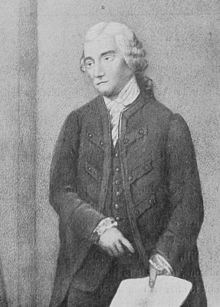John Zephaniah Holwell
Appearance

John Zephaniah Holwell FRS (17 September 1711 – 5 November 1798) was a surgeon, an employee of the British East India Company, and a temporary Governor of Bengal (1760). He was also one of the first Europeans to study Indian antiquities.
Quotes
[edit]- A significant section of early Englishmen in India also found in Indian culture “a deep and appealing wisdom.” John Z. Holwell (1711-1798), in his Interesting Historical Events, relative to the Provinces of Bengal and the Empire of Indostan (1767), declared that “the world does not now contain annals of more indisputable antiquity than those delivered down by the ancient Brahmins.” He avowed that the people “from the earliest times have been an ornament to the creation if so much can with propriety be said of any known people upon earth.”
- quoted in Jain, S., & Jain, M. (2011). The India they saw: Foreign accounts. New Delhi: Ocean Books. vol 4. Introduction
- Holwell wrote in his preliminary discourse to the Religious Tenets of the Gentoos, "Having studiously perused all that has been written of the empire of Indostan, both as to its ancient as well as more modern state; as also the various accounts transmitted to us, by authors in almost all ages.... I venture to pronounce them all very defective, fallacious and unsatisfactory to an inquisitive searcher after truth; and only tending to convey a very imperfect and injurious resemblance of a people, who from the earliest times have been an ornament to the creation if so much can with propriety be said of any known people upon earth."
- A mere description of the exterior manners and religion of a people, will no more give us a true idea of them than a geographical description of a country can convey a just conception of their laws and government. The traveller must sink deeper in his researches.... His telling us such and such a people, in the East or West Indies, worship this stork, or that stone, or monstrous idol; only serves to reduce in our esteem our fellow creatures to the most abject and despicable point of light. Whereas, was he skilled in the language of the people he describes, sufficiently to trace the etymology of their words and phrases, and capable of diving into the mysteries of their theology; he would probably be able to evince to us, that such seemingly preposterous worship, had the most sublime rational source and foundation."
- quoted in Ibn, W. (2009). Defending the West: A critique of Edward Said's Orientalism. Amherst, N.Y: Prometheus Books.

